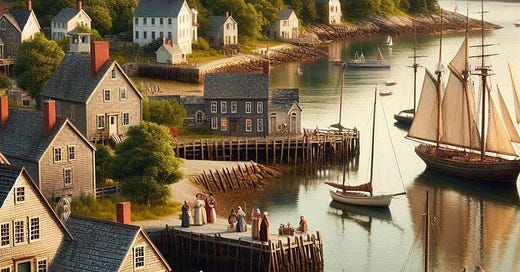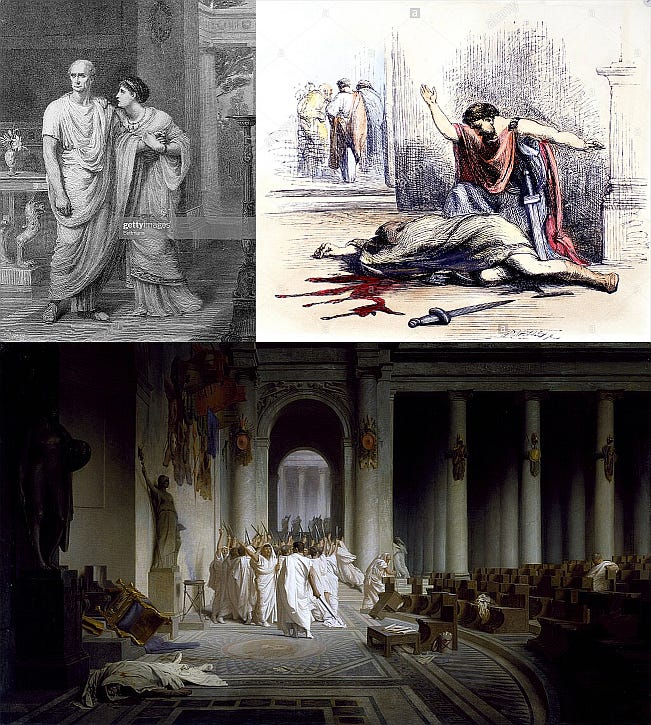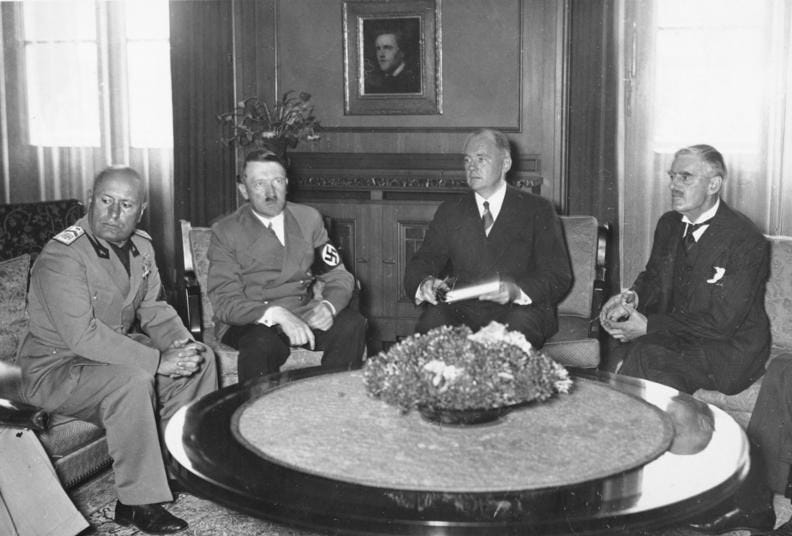The Mysteries of History (March 15 Edition)
The Ides of March; Maine; First Pro Baseball Team; Van Gogh; Nazis Take Czechoslovakia; Chinese Civil War
44 B.C. — Caesar Assassinated
public domain images from wikimedia commons
“Beware the Ides of March!” My egghead ten-and-a-half-months-older-than-me (I was a preemie) brother used to say that a lot, and I had no idea what he was talking about. Those silly old Romans said “Ides” when they should have just said “Beware the middle part of March.” Then again, saying Ides is quicker, but it doesn’t help much if people don’t know what “Ides” means.
Poet extraordinaire Robert Frost also referred to this time of the year as unpleasant in his “Two Tramps in Mud Time”:
The sun was warm but the wind was chill.
You know how it is with an April day
When the sun is out and the wind is still,
You're one month on in the middle of May.
But if you so much as dare to speak,
A cloud comes over the sunlit arch,
A wind comes off a frozen peak,
And you're two months back in the middle of March.
What the Romans were referring to, though, was when Julius Caesar was assassinated by what he would have called terrorists, or at best traitors, on this date in 44 B.C., five years after crossing the Rubicon. It wasn’t the work of one man; there were 60 conspirators, led by two men, the more famous of which (now, anyway) being “Brutus” (Marcus Junius Brutus) because of Caesar’s surprised/hurt reaction (according to Shakespeare, anyway) to being stabbed, “Et tu, Brute?” (You, too, Brutus?).
Questions: Why did Brutus and his cohort/co-conspirators decide that Julius Caesar had to go? What was the significance of Julius Caesar crossing the Rubicon in 49 B.C.? Is Caesar salad named after a Roman emperor?
1820 — Maine Becomes the 23rd State
public domain image from wikimedia commons
image generated using Bing Image Creator
On this date in 1820, Maine become the 23rd of the eventual 50 United States. Before that, it had been considered part of Massachusetts, or under Massachusetts’ oversight. Prior to that, France and Britain had fought each other for control of it. It is the most sparsely populated State east of the Mississippi River.
For more on the whys and wherefores of Maine becoming a State, see the “Missouri Compromise” section here.
Questions: Have you ever been to Maine? Have you ever heard songwriter extraordinaire Roger Miller’s song “King of the Road”? Which city in Maine does he reference in that classic finger-snapper? Was Bullwinkle from Maine? Are residents of the State called Maineiacs?
1869 — The First Professional Baseball Team
public domain image from wikimedia commons
Who would have known that the Cincinnati Reds were the first professional baseball team (before the New York Yankees, Boston Red Sox, or any of the others)? Then known as the Red Stockings, they became the first professional baseball team on this date in 1869. Baseball existed since 1846, but prior to 1869, paying players was disallowed.
The Red Stockings went undefeated (57-0) in 1869. All pitching was done, softball-like, underhand. One of their victories was by a score of 103-8 (against another Cincinnati team, the Buckeyes.
One player, George Wright (who was a nepo baby brother, as his older brother was the manager of the team), batted .640 and hit 49 homeruns that inaugural season.
The team changed its name to the Reds in 1881 after being expelled from the league the previous season for selling beer at their games (egads!) and wanting to play on Sundays (egods!).
Questions: Have you ever heard of “The Big Red Machine”? Which players during that era are now in the Hall of Fame? Which prominent player of that time is not in the Hall of Fame, even though he holds several records, including most career hits (4,256)?
1901 — Vincent Gains World Fame
“The Bedroom”; public domain image from wikimedia commons
Eleven years after he died, Vincent Van Gogh (1853-1890) gained fame and fortune — well, he gained fame, but the spoils went to others. Van Gogh had only sold one painting during his lifetime. He was recognized as an important artist on this date in 1901, when a retrospective exhibit of his work was displayed.
Van Gogh’s top ten paintings have sold for $712 million. For all of his artwork, well over a billion dollars has been collected — and that’s not counting money generated for all of the prints (that’s just for the originals).
Seventy years after Van Gogh gained posthumous fame at that 1901 exhibit where his genius was finally acknowledged, Don McLean released the song “Vincent” about Van Gogh (on the American Pie album), making Van Gogh (and McLean) all the more famous, doubtless contributing to the continued popularity of his work.
Questions: Where was Vincent Van Gogh born? Where did he die? How old was he when he died? What was his relationship with his brother Theo? How many years did he paint? Who were some of his painter friends. Who influenced him? Who has he influenced? Which is your favorite Van Gogh painting? Who is your favorite painter?
1939 — Hitler Takes a Mile
public domain image from wikimedia commons
Given an inch, Adolf Hitler took a mile. The Munich Pact, meant as a way to preserve peace by appeasing Hitler, instead in effect handed over Czechoslovakia to the Nazis. They invaded and took control of the entire country (rather than just the portion of it that was populated by Germans, the Sudetenland) on this date in 1939, just six months after that pact.
Questions: Why did Hitler want to control Czechoslovakia. What concessions were given him prior to invading? What level of resistance did the Nazis face from the Czechs? Did anybody come to their defense?
1950 — Chinese Civil War
public domain image from wikimedia commons
On this date in 1950, Chinese forces from Taiwan invaded mainland China. Those in Taiwan, who self-exiled themselves to that island, claimed they were the true Chinese government, and the United States regarded them as such.
Those in Taiwan were mainly nationalist (anti-communist) military personnel, political leaders, and their supporters, who had lost a Civil War to communist forces led by Mao Zedong.
The invasion was initially partially successful, but ultimately the nationalist forces were driven back to Taiwan by the communist forces on the mainland.
Questions: Who was Chiang Kai-Shek? Where did Chinese and American soldiers fight each other within months of this event? Why did President Truman not agree to use Chinese nationalist forces on Taiwan against the Chinese communist forces? Had he done so, what is the most likely scenario resulting from that?













